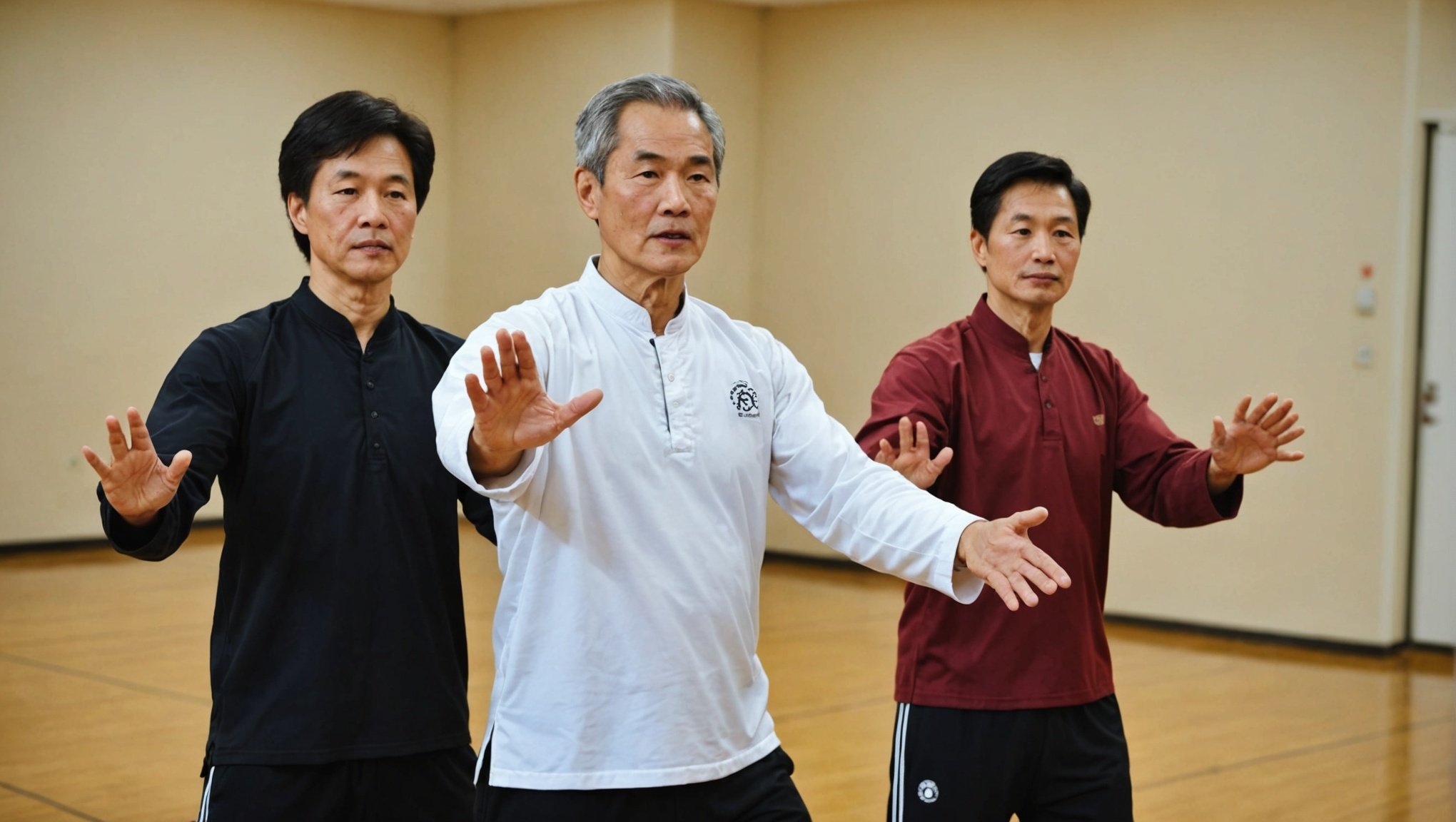The Benefits of Consistent Tai Chi Practice on Joint Wellness: Exploring Its Impact on Your Health to Tai Chi and Its Significance
Tai Chi, an ancient Chinese martial art, has evolved into a widely practiced form of exercise that combines slow, flowing movements with deep breathing and meditation. This holistic practice is not just a physical activity but a mind-body exercise that offers a myriad of health benefits, particularly for joint wellness. In this article, we will delve into the specific advantages of consistent Tai Chi practice on your health, focusing on its impact on joint health, mental well-being, and overall quality of life.
Improved Physical Fitness and Joint Health
One of the most significant benefits of Tai Chi is its positive impact on physical fitness, particularly for joint health. Here are some key ways Tai Chi enhances your physical well-being:
Have you seen this : Exploring the Impact of Virtual Reality on Cognitive Rehabilitation for Brain Injury Survivors
Increased Flexibility and Mobility
Tai Chi involves a series of gentle, flowing movements that help increase flexibility and mobility. Regular practice enhances muscle elasticity and joint mobility, which is especially beneficial for older adults who may experience reduced flexibility due to aging.
Strengthened Muscles
Resistance training is an integral part of Tai Chi, which helps build muscle strength without the high-impact stress associated with other forms of exercise. This is particularly beneficial for people with joint issues, as it strengthens the muscles around the joints without exacerbating existing conditions.
This might interest you : Proven Strategies to Minimize Screen Time and Enhance Your Mental Well-Being
Better Balance
Tai Chi is renowned for its ability to improve balance. The slow, controlled movements help improve proprioception (the ability to sense the position and movement of your body), reducing the risk of falls and injuries, especially among older adults.
Mental Health and Stress Reduction
Beyond its physical benefits, Tai Chi has a profound impact on mental health and stress reduction.
Reduced Stress
The meditative aspect of Tai Chi, combined with deep breathing techniques, helps reduce stress levels. This is achieved through the release of endorphins, which are natural mood elevators, and by promoting a state of relaxation and calmness.
Improved Mental Health
Tai Chi has been shown to have positive effects on mental health, particularly in reducing symptoms of anxiety and depression. The mind-body connection fostered through Tai Chi practice helps individuals develop a greater sense of self-awareness and emotional regulation.
Specific Health Benefits for Various Conditions
Tai Chi is not just a general health improvement activity; it has specific benefits for various health conditions.
Parkinson’s Disease
For patients with Parkinson’s disease, Tai Chi has been shown to improve balance, reduce the risk of falls, and enhance overall motor function. The slow, controlled movements help improve coordination and balance, which are critical for managing the symptoms of Parkinson’s disease.
Chronic Pain
Tai Chi has been found to be effective in managing chronic pain. The combination of physical movement, deep breathing, and meditation helps reduce pain levels and improve the quality of life for patients suffering from chronic pain conditions.
Blood Pressure
Regular Tai Chi practice has been linked to lower blood pressure levels. The stress-reducing effects of Tai Chi, along with its physical benefits, contribute to better cardiovascular health and reduced risk of hypertension.
Practical Insights and Actionable Advice
If you’re considering incorporating Tai Chi into your life, here are some practical insights and actionable advice to get you started:
Finding the Right Class
Look for local Tai Chi classes or online tutorials that cater to your needs. Many community centers, senior centers, and health clubs offer Tai Chi classes specifically designed for older adults or people with joint issues.
Starting Slow
Begin with short sessions and gradually increase the duration as you become more comfortable with the movements. It’s essential to listen to your body and not push yourself too hard, especially if you have any underlying health conditions.
Consistency is Key
Consistency is crucial when it comes to Tai Chi. Aim to practice at least 2-3 times a week, and ideally every day if possible. Consistent practice will help you see the benefits more clearly over time.
Detailed Benefits in a Nutshell
Here is a detailed list of the benefits of consistent Tai Chi practice:
-
Improved Physical Fitness:
-
Increased flexibility and mobility
-
Strengthened muscles
-
Better balance
-
Enhanced cardiovascular health
-
Mental Health and Stress Reduction:
-
Reduced stress levels
-
Improved mental health
-
Enhanced self-awareness and emotional regulation
-
Specific Health Benefits:
-
Improved balance and motor function for Parkinson’s disease patients
-
Effective in managing chronic pain
-
Lower blood pressure levels
-
Quality of Life:
-
Improved overall quality of life
-
Enhanced social interactions through group practice
-
Better sleep quality
Comparative Analysis: Tai Chi vs. Other Forms of Exercise
Here is a comparative table highlighting the benefits of Tai Chi versus other forms of exercise:
| Exercise Type | Physical Benefits | Mental Benefits | Suitability for Joint Issues | Stress Reduction |
|---|---|---|---|---|
| Tai Chi | Flexibility, strength, balance | Reduced stress, improved mental health | Highly suitable | High |
| Yoga | Flexibility, strength, balance | Reduced stress, improved mental health | Suitable | High |
| Swimming | Cardiovascular health, muscle strength | Reduced stress | Highly suitable | Medium |
| Running | Cardiovascular health, weight loss | Reduced stress | Less suitable | Medium |
| Weightlifting | Muscle strength, cardiovascular health | Reduced stress | Less suitable | Low |
Real-Life Examples and Anecdotes
Many people have found significant improvements in their health through consistent Tai Chi practice. Here’s an example:
“Before starting Tai Chi, I struggled with chronic back pain and poor balance. After just a few months of practice, I noticed a significant reduction in my pain levels and a marked improvement in my balance. It’s been a game-changer for my overall health and quality of life.” – Sarah, 62, Tai Chi practitioner.
In conclusion, Tai Chi is a holistic exercise that offers a wide range of health benefits, particularly for joint wellness. Its slow, flowing movements combined with deep breathing and meditation make it an ideal activity for people of all ages and health conditions. Whether you’re looking to improve your physical fitness, reduce stress, or manage chronic health conditions, Tai Chi is an excellent choice.
As Dr. Peter Wayne, Director of the Osher Center for Integrative Medicine at Harvard Medical School, notes, “Tai Chi is a low-impact, slow-moving exercise that can help older adults improve their balance, reduce their risk of falls, and enhance their overall health and well-being.”
By incorporating Tai Chi into your life, you can experience these benefits firsthand and enjoy a healthier, more balanced life. So why not give it a try? Your body—and mind—will thank you.






